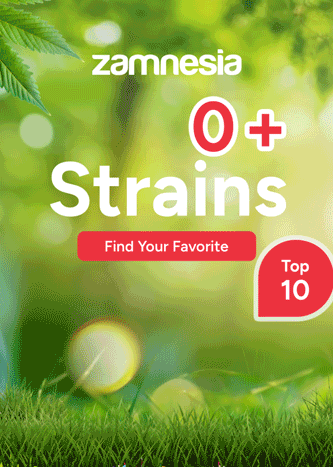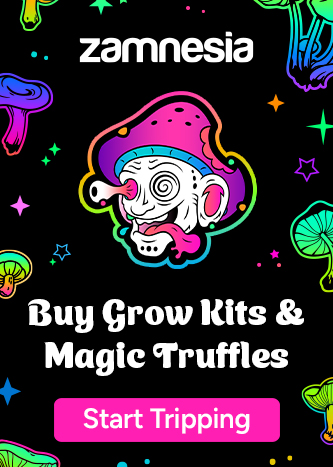How is CBD oil processed in the body?
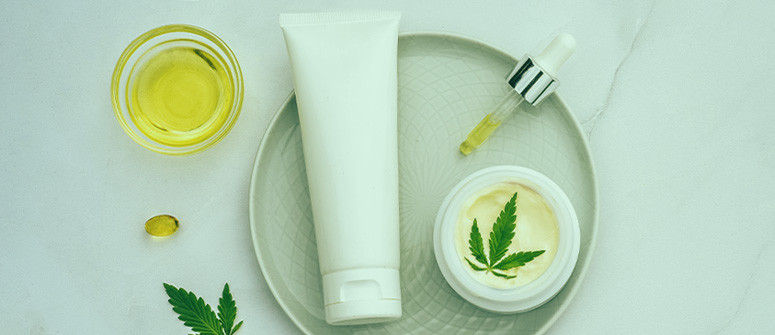
A substantial amount of people use CBD oil, many on a daily basis. But how is cannabidiol actually processed by the body? And how does it exert its effects? Are there any issues with addiction or dependence to worry about? In this article, we look at these points, and more, to demystify how CBD oil works in the body.
Contents:
Cannabidiol (CBD) has become wildly popular in the last several years. Of all the CBD products available, CBD oil is perhaps the most ubiquitous and widely used. In part, this is due to its versatility; CBD oil can be consumed in a number of ways, all of which distance the product from traditional methods of cannabis intake, such as smoking, vaping, or eating infused baked goods.
Many use CBD oil to positively influence their lifestyle, or to address a certain issue—but how exactly does this cannabinoid interact with the body? For how long does it stay in your system? And will anything happen to you if you take CBD oil after the expiry date? In this article, we explore how CBD works in/with the human body, and what this means for CBD oil users.
CBD and the endocannabinoid system

CBD works in the human body partly by interacting with the endocannabinoid system (ECS). The ECS is an extensive network of channels and receptors (predominantly CB1 and CB2 receptors) that runs throughout the human nervous system, brain, organs, and cells. In fact, there are few functions or parts of the body that do not involve the ECS. Mainly, it is used for cell-signalling purposes, helping cells to adapt to changes or telling neurotransmitters to increase or decrease activity.
The ECS is by no means fully understood, and neither are its interactions with phytocannabinoids (cannabinoids that come from plants) like CBD and THC. However, we do have a degree of knowledge regarding how CBD interacts with the body via the ECS.
To give some context, the primary psychotropic cannabinoid THC mimics a major endocannabinoid (i.e. a cannabinoid produced by the human body) called anandamide, and thereby binds directly with the CB1 receptor, causing the well-known cannabis “high”.
The mechanisms of action for CBD are a little more roundabout. CBD is actually a mild antagonist of the CB1 receptor, meaning that it blocks activity there, which is thought to be an explanation for why CBD might mitigate the effects of THC.¹ However, CBD seems to chiefly affect ECS activity through inhibition of FAAH.² FAAH is an enzyme that breaks down anandamide—so by inhibiting it, concentrations of naturally produced anandamide are higher in the body.
Given that, when humans consume CBD, concentrations of anandamide may become higher for the duration of time that CBD is present in the system. As such, users may experience the natural benefits of this so-called “bliss molecule”, but without the intoxication caused by THC.
Does CBD interact with other receptors?
CBD is also believed to interface with receptors outside of the traditional ECS, including serotonin and capsaicin receptors, among others. As such, the full scope of CBD's mechanisms and effects is perhaps much greater than we currently understand.
Is CBD naturally present in your body?
Unlike endocannabinoids, such as anandamide, CBD is not produced in the human body; it is produced in the trichomes of the cannabis plant. It just so happens that cannabinoids produced by cannabis plants are able to interact with the ECS in a similar way as endocannabinoids. In fact, the ECS is named after cannabinoids from cannabis, as they aided in the system’s discovery.
What are the effects of CBD oil?
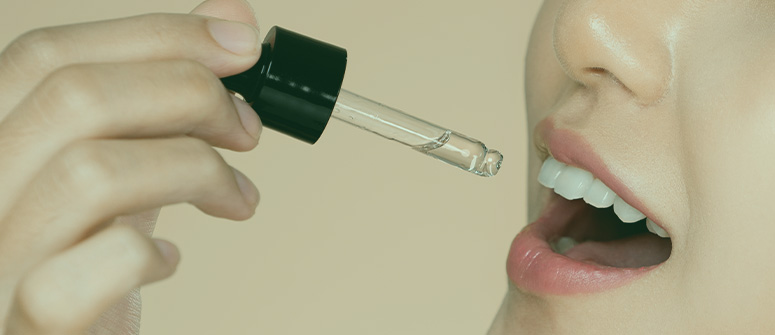
CBD has a wide range of potential effects. Some are fairly well-studied; others much less so. All are fraught with speculation. To some degree, the effects of cannabidiol vary based on the method of administration.
How does CBD enter the body?
CBD enters the body in three main ways:
- Through the lungs
- Through the mucous membranes
- Via the stomach
CBD transdermal patches also exist, which deliver CBD through the skin into the bloodstream, as well as CBD topicals (e.g. creams, lotions, balms), which produce local effects on the skin only.
For this article, we will focus on CBD oil, which is either delivered through the mucous membranes (sublingual intake) or the stomach and liver (oral intake). The former involves holding CBD oil beneath the tongue, where it is absorbed directly into the bloodstream. The latter method involves dropping CBD oil directly into the mouth and swallowing, or adding it to food or drink first.
Note that conventional CBD oil should NOT be vaped/inhaled; this can cause serious health issues. Instead, if you want to vape CBD, look for dedicated CBD vape juice or liquid.
Does CBD oil have proven health benefits?
CBD has been studied for its potential to affect many bodily process, such as:
- Sleep
- Stress
- Anxiety
- Appetite
- Inflammation
- Pain
Regarding each of these points, there’s a large gap between clinical research and real-life evidence. For instance, the doses of CBD used in many studies are far higher than what people would take at home, meaning that applyinging these findings to a home environment can be very challenging. However, anecdotal evidence supports study findings in many cases.
That being said, don’t expect CBD to be some cure-all that will make all of your ailments fade away. More likely, it can be used as an effective part of a mindful and holistic process.
On the flip side, some people have concerns about taking CBD, such as:
- Can CBD make your body tingle?
- Does CBD oil increase body temperature?
- Is CBD addictive?
The answer to all of these questions is no. CBD has very few noticeable effects, and body tingling isn’t usually one of them. Likewise, CBD shouldn’t raise your body temperature.
Regarding the final point, the World Health Organization concluded that CBD is not addictive, nor does it have the potential for abuse. However, that does not mean that CBD is entirely without side effects, some of which can be unpleasant.
How does CBD oil affect your organs?
As mentioned, if ingested, CBD is metabolised in the liver. A murine study from 2019 shows that mice given a very high dose of CBD suffered damage to their livers.³ From this, the researchers conclude that at extremely high doses, CBD may have some toxicity.
The general consensus seems to be that people should be cautious when ingesting CBD, but not afraid. The mice in this study were given the equivalent of a 200mg dose. For perspective, a normal dose for humans is between 5 and 10mg.
So, if you’re sticking to these sorts of doses, you probably needn’t worry. However, if you’re taking relatively high doses, then it may be worth investigating or speaking to a medical professional. If you’re concerned, consider taking CBD oil sublingually, or opting for an entirely different form of consumption, such as vaping.
How is CBD oil processed by the liver?
When CBD is ingested, it passes through the stomach and into the liver—prior to entering the bloodstream. Once in the liver, cytochrome P450 enzymes begin to break CBD down into metabolites; chiefly 7-OH-CBD and 7-COOH-CBD.
This method of consumption causes much of the CBD to be excreted, without entering the blood. Therefore, some people opt for other methods of consumption, which can be considered more efficient.
Also, though there is little research surrounding specific interactions between CBD and other drugs in the liver, it’s worth exercising caution, as some serious interactions could occur. Always consult your doctor for more information.
What are the effects of out-of-date CBD oil?
Potentially non-existent. Over time (usually about a year or two after purchase when stored in good conditions) CBD oil can degrade. However, if you consume it after this period, you shouldn’t suffer adverse effects. In fact, you probably won’t experience any effects. While the oil should be okay to consume, the CBD will have degraded, rendering it fairly useless.
When will you feel the effects of CBD oil?
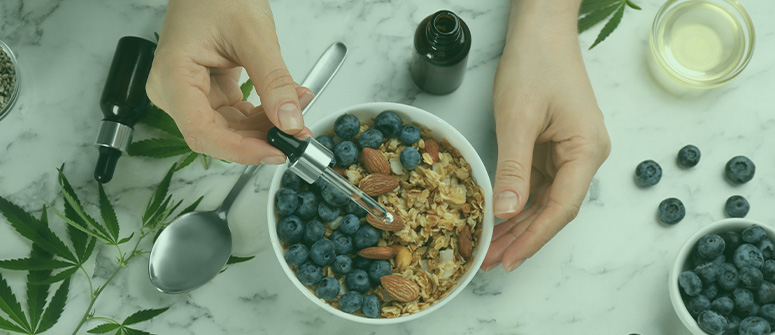
The method of consumption will greatly affect the amount of time it takes for CBD to take effect. If you take CBD sublingually or via the lungs, it should take effect within 15 minutes. However, if you ingest it, it can take up to an hour or more to take effect, but sometimes as little as 15 minutes.
Factors such as how much you’ve eaten and whether you’re active or sedentary will increase or decrease the amount of time it takes for ingested CBD to take effect.
How long does CBD stay in your system?
Once again, the answer to this question is mostly determined by the method of consumption. Ingested CBD has a half-life of around 3 hours. This means that after 3 hours from taking effect, half of the initial dose will have been broken down by the body. The amount will then continue to halve every 3 hours until it has all been metabolised. In general, the effects of orally ingested CBD last for between 6 and 8 hours.
Vaped CBD "hits" faster, but has a shorter half-life, with effects lasting around 4–6 hours.
What happens if I stop taking CBD oil?
As CBD is not addictive, you shouldn't suffer any withdrawal symptoms if you suddenly stop taking it.
However, if it has been helping you in some way, you may experience a resurgence of issues that it helped to manage. But, simply put, you can stop taking CBD oil with no ill effects.
CBD oil and the body: A complex relationship

We have a lot more to learn about CBD and its relationship to the body. Hopefully, as more findings are revealed, we will come to understand how we can use CBD oil to help ourselves and others.
For now, it seems likely that CBD can be beneficial in certain circumstances, but, save for a select few cases, we aren’t sure of the specifics. The good news is that, if used responsibly, CBD oil appears to have no serious negative effects (when used in isolation), which leaves the door open for personal experimentation, allowing you to discover how CBD best works for you.
References:
- Hudson, R., Renard, J., Norris, C., Rushlow, W. J., & Laviolette, S. R. (2019). Cannabidiol counteracts the psychotropic side-effects of Δ-9-tetrahydrocannabinol in the ventral hippocampus through bidirectional control of ERK1–2 phosphorylation. The Journal of Neuroscience, 39(44), 8762–8777. https://doi.org/10.1523/jneurosci.0708-19.2019
- Elmes MW, Kaczocha M, Berger WT, et al. Fatty acid-binding proteins (FABPs) are intracellular carriers for Δ9-tetrahydrocannabinol (THC) and cannabidiol (CBD). J Biol Chem. 2015;290(14):8711-8721. doi:10.1074/jbc.M114.618447
- Ewing LE, Skinner CM, Quick CM, Kennon-McGill S, McGill MR, Walker LA, ElSohly MA, Gurley BJ, Koturbash I. Hepatotoxicity of a Cannabidiol-Rich Cannabis Extract in the Mouse Model. Molecules. 2019; 24(9):1694. https://doi.org/10.3390/molecules24091694
